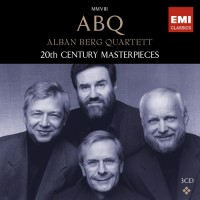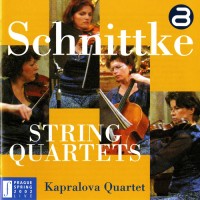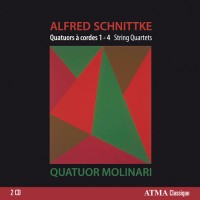Schnittke’s Fourth Quartet
|
Walt Mundkowsky [March 2013.] “20th Century Masterpieces.” Alfred SCHNITTKE: String Quartet No. 4 (1989). (Rec. live at the Mozart-Saal, Konzerthaus, Vienna, 12-11-1990.) Alban Berg Quartett: Günter Pichler, Gerhard Schulz (vlns), Thomas Kakuska (vla), Valentin Erben (vc). Works by J. STRAUSS II (arr. SCHOENBERG), BERG, JANÁČEK, BARTÓK, STRAVINSKY, PIAZZOLLA, LUTOSŁAWSKI, HAUBENSTOCK-RAMATI, von EINEM, BERIO. EMI 5 13974 2 (3 CDs) (http://www.emiclassics.com/). Alfred SCHNITTKE: String Quartets – No. 1 (1966), No. 3 (1983), No. 4 (1989); Canon in Memoriam Igor Stravinsky (1971). (Rec. live at the Church of St. Simon and St. Jude, Prague, 5-24 & 31-2002.) Kapralova Quartet: Rita Čepurčenko, Simona Hurníková (vlns), Světlana Jahodová (vla), Margit Klepáčová (vc). Arco Diva UP 0054-2 131 (http://www.ArcoDiva.cz/). Alfred SCHNITTKE: String Quartets – No. 1 (1966), No. 2 (1980), No. 3 (1983), No. 4 (1989); Canon in Memoriam Igor Stravinsky (1971). Quatuor Molinari: Olga Ranzenhofer, Frédéric Bednarz (vlns), Frédéric Lambert (vla), Pierre-Alain Bouvrette (vc). ATMA Classique ACD2 2634 (http://www.atmaclassique.com/). Distributed in the US by Naxos (http://www.naxos.com/). Composed in 1986 (Russia) or 1989 (West Berlin) – there’s some disagreement – Schnittke’s Fourth Quartet ranks high among his post-1985 oeuvre. It has never gotten its due, and likely won’t. (The “polystylism” of his most jolting period was nearly absent after his first stroke.) He esteemed Berg’s music “above all others,” and the Alban Berg Quartett premiered the work live (10-21-1989, Vienna) as well as on disc. Since then it turns up only when a group undertakes all four Schnittke quartets. That’s a pity, for it marks a great advance over his first three and works best when heard by itself. At times the Fourth sounds very Second Viennese School. Over the first ten bars the cello presents a clear tone row in two chromatic hexachords. Lasting 36 to 38 minutes, the whole can’t be termed efficient but its five movements (three of them Lento) gather strength as they proceed. The concluding movement is the longest, and a shattering leave-taking in the right hands. Alexander Ivashkin, a fine cellist, has said, “A work of Russian art is a confession. There is nothing commonplace in it, nothing decorative, well balanced, or moderate. Everything is extreme….” As a Schnittke admirer, could he have been describing this piece? * The ABQ’s Schnittke Fourth lives on in this EMI set; a larger box, “Hommage,” collects the rest of those albums’ components. (Rihm’s Fourth was the Schnittke’s original discmate.) Violist Kakuska passed away in 2005, and the ABQ disbanded three years later. They took a precisionist modern slant with rich sonority, potent where expected (Beethoven, Schubert, Berg) and not – their Lutosławski Quartet was the composer’s favorite realization. This live taping offers expertly judged dynamics (that opening cello line emerging ex nihilo) and a silent audience. The ABQ’s elucidation pays dividends. Even the “messy sincerity” (Seth Brodsky) is a very specific messy, nothing unexamined or generic. Applause at the end has been removed. * Prague Spring 2002 included the Kapralova Quartet’s Schnittke cycle. (No. 2 has been dropped so the remainder would fit on a single CD.) I fail to engage with any aspect here, from the live feed (close and harsh) to the rough execution. The third movement Lento comes off acceptably, but the following Vivace staggers. For me, festival recordings don’t often gain shelf space (the missing accents on Kaprálová also annoy). * Quatuor Molinari’s intégrale is a 2010 job, so its sound has more detail than the ABQ’s concert two decades earlier. Except for that Vivace, the Molinari is notably slower (38:07 to 36:38) and pushes harder. The ABQ’s finale shocks and touches this listener more deeply; still, the Molinari’s chops and grasp of the niceties both impress. No. 4 leads off their second disc, a good idea. * further reading Aaminah Durrani’s dissertation, “Chorale and Canon in Alfred Schnittke’s Fourth String Quartet” (2005), reveals Schnittke’s ingenuity without slighting the score’s power. I learned something. * equipment Bryston BCD-1 player – Acoustic Revive XLR cables – Schiit Mjolnir headphone amp – Ergo AMT (Heil) headset.
[More Walt Mundkowsky]
[More
Schnittke]
[Previous Article:
Can These Bones Live? A prejudiced ramble through Paris et environs]
[Next Article:
Luc and Brunhild (EA Bucket 17.)]
|


